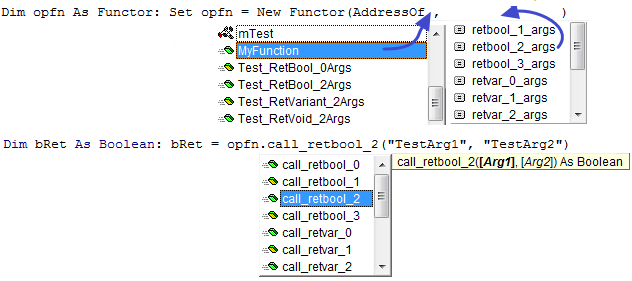VBA 中的 Functor
4.40/5 (10投票s)
本文介绍了使用 C++ ATL 为 VBA 实现函子(某种程度上)。

引言
本文提出了一种在 ATL 中为 VBA/VB6 使用函子(即函数对象)的实现方法。
VBA 对指针的支持非常少,除了 AddressOf 运算符外,不支持函数指针。 在过去几年里,我一直在使用 Excel VBA,我经常觉得,如果能够访问函数指针,我的通用编程工作将会变得轻松得多。
此实现允许编写如下所示的 VBA 代码
'-- Initialize a functor that hooks on a **Sub** that takes two args.
Dim opfn As Functor: Set opfn = New_Functor(AddressOf MyFunction, retvoid_2_args)
'-- Invoke the function through the functor
Call opfn.call_retvoid_2("This works", " fine!")
背景/ C++ 实现
该项目(用 C++ ATL - VS2010 编写)编译成一个 COM DLL。 导出的 Functor 对象可以在 VBA 代码中使用以
- 存储函数的地址(函数类型在此阶段是一个输入)和
- 稍后通过使用与函数类型匹配的
Functor对象的方法来调用它
HookFunction() 方法和一个示例函数调用方法的 IDL 声明如下
interface IFunctor : IDispatch{
[id(1), helpstring("Hooks on a function")]
HRESULT HookFunction([in] LONG fnAddress, [in] enum FuncType functionType);
[id(8), helpstring("Calls Function that a)Retruns VARIANT b)Takes 2 arguments")]
HRESULT call_retvar_2([in,out,optional]VARIANT*
Arg1,[in,out,optional]VARIANT* Arg2,[out,retval]VARIANT*);
被挂钩的函数可以是 Functor.h 中 typedef 的类型之一
// Functions returning void
typedef HRESULT (__stdcall *pfn_retvoid_0)(void);
typedef HRESULT (__stdcall *pfn_retvoid_1)(VARIANT*);
typedef HRESULT (__stdcall *pfn_retvoid_2)(VARIANT*, VARIANT*);
typedef HRESULT (__stdcall *pfn_retvoid_3)(VARIANT*, VARIANT*, VARIANT*);
// Functions returning VARIANT
typedef HRESULT (__stdcall *pfn_retvar_0)(VARIANT*);
typedef HRESULT (__stdcall *pfn_retvar_1)(VARIANT*, VARIANT*);
typedef HRESULT (__stdcall *pfn_retvar_2)(VARIANT*, VARIANT*, VARIANT*);
typedef HRESULT (__stdcall *pfn_retvar_3)(VARIANT*, VARIANT*, VARIANT*, VARIANT*);
// Functions returning VBA Boolean
typedef VARIANT_BOOL (__stdcall *pfn_retbool_0)(void);
typedef VARIANT_BOOL (__stdcall *pfn_retbool_1)(VARIANT*);
typedef VARIANT_BOOL (__stdcall *pfn_retbool_2)(VARIANT*, VARIANT*);
typedef VARIANT_BOOL (__stdcall *pfn_retbool_3)(VARIANT*, VARIANT*, VARIANT*);
这些函数类型对应于 enum FuncType (定义在 VBA_Functors.idl 中) 的成员,该枚举也从 DLL 中导出
[
uuid(708D69A2-B470-4530-82B7-5D825EC9F8ED),
v1_enum
]
enum FuncType
{
retvoid_0_args,
retvoid_1_args,
retvoid_2_args,
retvoid_3_args,
retvar_0_args,
retvar_1_args,
retvar_2_args,
retvar_3_args,
retbool_0_args,
retbool_1_args,
retbool_2_args,
retbool_3_args
};
该 DLL 还导出一个初始化器类(用于模拟带有参数的构造函数),该类公开返回新初始化的 COM 对象的函数; 此处 New_Functor() 返回一个新初始化的 Functor (IFunctor) 对象。 来自 ClassInitializer.cpp
// Returns a newly initialized Functor object
STDMETHODIMP CClassInitializer::New_Functor(/*[in]*/LONG fnAddress,
/*[in]*/FuncType functionType, /*[out,retval]*/IFunctor** ret)
{
HRESULT hr = CFunctor::CreateInstance(ret);
if (FAILED(hr)){
return hr;
}
return (*ret)->HookFunction(fnAddress, functionType);
}
IDL 声明如下。 注意 coclass ClassInitializer 的 appobject 属性。 这使得该对象成为全局对象(即,其方法可以被引用 DLL 而无需声明该类型变量的 VBA 代码调用)。
[...]
interface IClassInitializer : IDispatch{
[id(1), helpstring("Returns a newly initialized Functor object")]
HRESULT New_Functor([in] LONG fnAddress, [in] enum FuncType functionType,
[out,retval] IFunctor**);
};
library VBA_FunctorsLib
{ ...
[
appobject,
uuid(C9CE3589-1E7F-4750-9E5F-4B48DB1883DB)
]
coclass ClassInitializer
{
[default] interface IClassInitializer;
};
}
Using the Code
源代码中包含的文件 [VBA_Functors_Test.xls] 包含一些(人为的)使用 VBA 中的 Functor 对象的示例。
- VBA 项目包含对 DLL (VBA_Functors.dll) 的引用
- DLL 是一个 COM DLL,需要注册(通常使用 regsvr32.exe,有关一些说明,请参阅此链接)
为了从 VBA 正确初始化 Functor 对象,您需要
- 声明和初始化
Functor变量 - 挂钩到现有的 VBA 函数。 该函数必须是预先指定的类型之一,并且需要通过
HookFunction()的第二个参数传入正确的函数类型(如上所述,函数类型封装在FuncType枚举中,因此 VBA 自动完成方便地启动)
Public Function SimpleFunction(ByRef vDisplay As Variant) As Variant
SimpleFunction = MsgBox(vDisplay, vbYesNo, "Did that display correctly?")
End Function
Public Sub UseFunctors()
Dim ofn As Functor: Set ofn = New Functor
Call ofn.HookFunction(AddressOf SimpleFunction, retvar_1_args)
End Sub
使用函数 New_Functor() 允许更紧凑的语法
Public Sub UseFunctors()
Dim ofn As Functor: Set ofn = New_Functor(AddressOf SimpleFunction, retvar_1_args)
End Sub
然后,您可以使用 Functor 对象来调用被挂钩的函数。 这是扩展后的 UseFunctors() sub,包括函数调用
Public Sub UseFunctors()
Dim ofn As Functor: Set ofn = New_Functor(AddressOf SimpleFunction, retvar_1_args)
Dim vbmRes As VbMsgBoxResult
vbmRes = ofn.call_retvar_1("Display this!")
End Sub
当调用带有 Functor 参数的函数时,使用 New_Functor() 还可以内联初始化函子。 考虑一下从示例 .xls 文件中的 MORE REALISTIC EXAMPLE 部分获取的以下代码段
'-- Predicate functions
Public Function IsMultipleOfTwo(ByRef vNumber As Variant) As Boolean
IsMultipleOfTwo = (0 = vNumber Mod 2)
End Function
Public Function IsMultipleOfThree(ByRef vNumber As Variant) As Boolean
IsMultipleOfThree = (0 = vNumber Mod 3)
End Function
'-- The generic function
Public Function CountMultiplesOfNumber(ByRef lNumber() As Long, _
ByRef pfn As Functor) As Long
Dim vIter As Variant
For Each vIter In lNumber
If pfn.call_retbool_1(vIter) Then CountMultiplesOfNumber = _
CountMultiplesOfNumber + 1
Next vIter
End Function
'-- The client code
Public Sub TestAbove()
Dim alNUms(0 To 100) As Long ' The array is somehow initialized...
'-- CountMultiplesOfNumber is Customized using a Functor constructed in line
MsgBox CountMultiplesOfNumber(alNUms, New_Functor_
(AddressOf IsMultipleOfThree, retbool_1_args))
End Sub
我认为,当人们考虑从 DLL 中导出“库存”函子(想到了全局对象的导出方法)时,事情会变得更加有趣,这些函子可以选择性地用于 VBA 端,以驱动 DLL 导出的算法的行为(在 VBA SafeArrays 上变异/非变异 for_each 吗?)
关注点
一些值得注意的点
- 在企业环境中工作后,我意识到安全策略可能会与 COM 组件的注册发生冲突。 后者传统上是在
HKEY_LOCAL_MACHINE下注册的,而典型用户没有对该配置单元的写访问权限。在
HKEY_CURRENT_USER下注册组件可以解决此问题。 在 ATL 中,可以使用AtlSetPerUserRegistration(true)来实现该目的。 这是 VBA_Functors.cpp 中的DllRegisterServer定义// DllRegisterServer - Adds entries to the system registry. STDAPI DllRegisterServer(void) { // Register/Unregister under HKCU ATL::AtlSetPerUserRegistration(true); // registers object, typelib and all interfaces in typelib HRESULT hr = _AtlModule.DllRegisterServer(); return hr; } - 此项目中包含的文件 com_definitions.h 将通常用作 COM 方法返回值的
HRESULT结构化为COMErrorCodes命名空间下的enum。 这允许编写如下所示的代码(而无需在 WinError.h 中查找代码)STDMETHODIMP CFunctor::call_retvoid_0(void){ if (retvoid_0_args == m_ft){ ... } else{ return Error(INCORRECT_FUNCTION_CALL_ERROR, __uuidof(IFunctor), COMErrorCodes::E__INVALIDARG); } } - 敏锐的观察者可能已经在返回
Boolean的函数的typedef中注意到,返回值没有实现为额外的[out,retval]参数。 而是通过函数的返回值直接返回True/False(大概是出于效率原因)typedef VARIANT_BOOL (__stdcall *pfn_retbool_0)(void);
历史
- 2011 年 6 月 3 日:第一次修订
